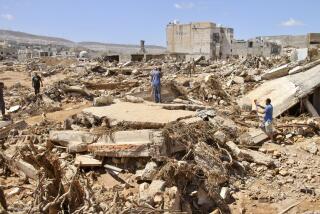NATO authorizes extending Libya mission 90 days
- Share via
Reporting from London and Tripoli, Libya — Leaders of the North Atlantic Treaty Organization authorized a 90-day extension of the alliance’s aerial mission over Libya on Wednesday, raising the prospect that U.S. and allied troops could be involved in the North African nation until Christmas.
But NATO Secretary-General Anders Fogh Rasmussen emphasized that the alliance could call home its forces “at any time” if international authorities and the new Libyan government determine that NATO’s help is no longer necessary.
“This decision sends a clear message to the Libyan people: We will be there for as long as necessary but not a day longer, while you take your future in your hands to ensure a safe transition to the new Libya,” Rasmussen said.
He said the alliance had been “remarkably successful” in executing a United Nations mandate to protect civilians, despite criticism that NATO’s warplanes and aerial bombing campaign routinely crossed the line into actively assisting revolutionary forces in their effort to topple Libya’s longtime strongman, Moammar Kadafi.
NATO took over enforcement of a no-fly zone over Libya in March, with an initial deadline for the mission at the end of June. A three-month extension was set to expire next week, but Wednesday’s decision renewed the operation until the end of December.
NATO fighter jets have flown more than 20,000 sorties over Libya in the last six months, dropping thousands of bombs to take out Kadafi’s command centers and military materiel. The alliance has reported no serious casualties in its air campaign, though Kadafi’s government alleged that the bombing killed hundreds of civilians and NATO has acknowledged several mistaken bombings of rebel forces.
With the erstwhile rebels now preparing to form a government in Tripoli, Washington has sent its former ambassador back to the Libyan capital to reopen the U.S. Embassy, which was shut down for the duration of the battle between Kadafi and his foes for control of the oil-rich nation.
Ambassador Gene Cretz returned to Libya on Wednesday. Appointed to the post in 2007 by former President George W. Bush, Cretz became the first U.S. ambassador to Tripoli after decades of diplomatic estrangement between the two countries.
In July, Washington recognized the anti-Kadafi Transitional National Council, then based in the city of Benghazi, as Libya’s legitimate governing authority.
Meanwhile, reports Wednesday indicated that Libya’s new rulers were close to winning full control of the southern desert crossroads city of Sabha, long a stronghold of support for Kadafi and the site of recent clashes.
A government takeover of Sabha probably would restrict escape opportunities for Kadafi and any associates still in Libya. The Saharan city is on the route to several neighboring nations, including Niger, where many Kadafi aides, along with his son Saadi, have already sought refuge.
The fall of Sabha would leave pro-Kadafi forces in control of just two major cities — Surt, Kadafi’s hometown on the Mediterranean coast, and Bani Walid, a tribal bastion southeast of Tripoli, the capital. Revolutionary fighters have faced fierce resistance in attempts to storm the two cities. A renewed attack on Surt is expected in a day or two.
In another blow to Kadafi, the African Union — an assemblage of nations that the former Libyan leader long championed — announced that it would recognize Libya’s transitional government, joining the United Nations and many countries that have taken the step since Tripoli fell last month. Also now opting to recognize Libya’s new rulers is South Africa, long a staunch supporter of Kadafi and critic of NATO airstrikes in the country.
More to Read
Sign up for Essential California
The most important California stories and recommendations in your inbox every morning.
You may occasionally receive promotional content from the Los Angeles Times.











